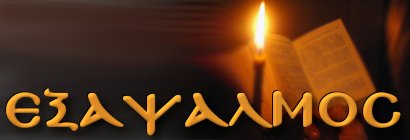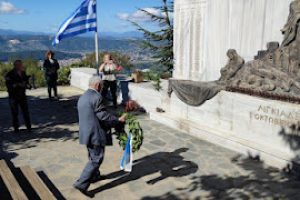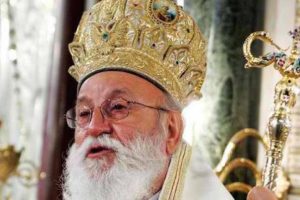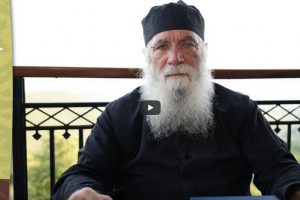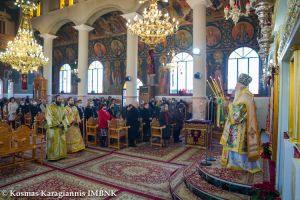Ιδού, έστηκα επί την θύραν…
Μητροπολίτου Φαναρίου Αγαθαγγέλου
Γενικού Διευθυντού Αποστολικής Διακονίας
της Εκκλησίας της Ελλάδος
Εισερχόμαστε, πατέρες και αδελφοί, με τη χάρη του Θεού, στην Αγία και Μεγάλη Εβδομάδα, την Εβδομάδα των Παθών, εν μέσω πειρασμών, θλί-ψεως και δοκιμασίας αίροντες τον σταυρό του παρόντος και διαλεγό-μενοι με το όντως φοβερώτατο μυστήριο τοῦ θανάτου. Καλούμεθα και πάλι να ζήσουμε με χαρμολύπη, αυτή την πονεμένη χαρά για την οποία μιλούν οι Ασκη-τές τῆς ἐρήμου, το μυστήριο του Σταυρού και την ελπίδα της Ανάστασης μακρυά από τον λειτουργικό βίο της Εκκλησίας, όπως αυτός τελεσιουργείται μέσα στο ναό και όπως διδαχθήκαμε από μικρά παιδιά μέχρι σήμερα. Ίσως και απέχοντες, για λόγους που επιβάλλουν η ανθρώπινη ανάγκη και η ασθένεια, από το μυστή-ριο της Θείας Κοινωνίας. Δεν είναι εύκολο, ιδιαίτερα για την κάθε ψυχή που αλη-θεύει ελεύθερα στην πίστη με αγάπη και ταπείνωση, με σιωπή και διάκριση, με αγώνα και προσευχή, με άσκηση και δάκρυα, με σταυρώσιμο ήθος και αναστά-σιμη διάθεση, με παράδειγμα και υπόδειγμα.
Ο Νυμφίος της Εκκλησίας, ο Κύριός μας και Θεός μας, που θα λιτανευθεί εν τω μέσω της νυκτός, θα έλθει φέτος να μας επισκεφθεί στα σπίτια μας. Δεν θα μας
αφήσει μόνους. Άλλωστε πάντοτε αυτό έκανε με οδυνώμενη αγάπη και παρα-φορά ερωτικής αγαθότητας. Στεκόταν στη θύρα της καρδιάς μας και την χτυ-πούσε να Του ανοίξουμε, για να μας εισαγάγει από του «νυν» στη χαρά της Βα-σιλείας Του. Άσχετα, αν καμμιά φορά, εμείς μαθημένοι στα αυτονότητα και την αυτάρκεια μιας αλαζονικής πίστης το ξεχνούσαμε. Η σχέση με τον Θεό δεν είναι μιά γνώση. Είναι κοινωνία, μυστήριο καρδιάς, πυρακτωμένη σχέση αγάπης που τελεσιουργείται μέσα στη σιωπή.
Ο Θεός επέτρεψε να ζήσουμε αυτή τη δοκιμασία. Γιατί; Ας προβληματι-σθούμε, ναι! Ας μη βιαστούμε όμως να απαντήσουμε και ιδιαίτερα εκείνοι που με ένα τρόπο θορυβώδη, αυθάδη, προκλητικό, αλαζονικό, εξουσιαστικό, με-γενθύνουν την άποψή τους λες και μπορούν να αναδειχθούν ανώτεροι από την αγάπη και τη δικαιοσύνη του Θεού, για να αναδειχθούν ως αρχηγοί οπαδών. «Μη λές ποτέ ότι ο Θεός είναι δίκαιος. Να λές ότι είναι φιλάνθρωπος. Γιατί, αν δεν ήταν φιλάνθρωπος, θα είμασταν καταδικασμένοι», λέγει ο άγιος Ισαάκ ο Σύρος. Στο παράπονο δε των δικαίων ανθρώπων- «εξεγέρθητι, Κύριε, ίνα τι υπνοίς»;- (Ψαλμ. 42ος), ο Χριστός δίδει την δική Του απάντηση: «ο αδικών αδικησάτω έτι, και ο ρυπαρὸς ρυπαρευθήτω έτι, και ο δίκαιος δικαιοσύνην ποιησάτω έτι, και ο ά-γιος αγιασθήτω έτι. Ιδοὺ έρχομαι ταχύ!» (Αποκ. 22, 11-12).
Ο Εσταυρωμένος Κύριος μας προετοιμάζει, πρίν την Ανάσταση, να ζήσουμε το νέο σκοτάδι της γης από έκτης ώρας έως ενάτης μέσα στο χρόνο του κόσμου. Το
φως της Ανάστασης όμως είναι αυτό που φωτίζει την πορεία μας προς τα έσχα-τα και την αιωνιότητα. Αυτό το φως μας χαρίζει ελπίδα, προσδοκία, αγάπη, κα-λωσύνη, ειρήνη, υπομονή, αυτοθυσία, ευαισθησία, τρυφερότητα, ανθρωπιά. Σκορπίζει ευλογίες! Αυτό το φως διακρατεί τον κόσμο από την αποσύνθεση και τη φθορά. Φωτίζει όλη την ύπαρξη, το βίο, τη ζωή, τα εγκόσμια και τα ουράνια. Κανένας δεν μπορεί να μας το στερήσει και να το στερηθεί. Είναι το δώρο του Πατέρα μας, η ανάπαυσή μας, η παρηγοριά μας, η χαρά μας! Πιστεύουμε στην Ανάσταση και προσδοκούμε την Ανάσταση. Ξέρουμε ότι ο θάνατος του Χριστού εκμηδένισε τη δύναμη του θανάτου. Και έτσι αντέχουμε! Ζούμε εν υπομονή με ελπίδα και προσδοκία. Ο Θεός και Πατέρας μας επιτρέπει τη δοκιμασία μέχρι εκεί που αντέχουμε..Και όταν τα ανθρώπινα σχήματα εξαντλούνται, τότε γίνεται το θαύμα!
Οι ναοί μπορεί να είναι κλειστοί. Να μην εισοδεύσουμε τον Εσταυρωμένο Χριστό μας, το γλυκύ Ἔαρ της Θεοτόκου. Ο Επιτάφιος να μη λιτανευθεί το βράδυ της Μεγάλης Παρασκευής. Να αποστερηθούμε να ανάψουμε το κερί μας στο «δεύτε λάβετε φως». Να δοξάσουμε εν χορώ στο μυστήριο της Σύναξης τον Αναστάντα Κύριο. Κανένας όμως δεν μπορεί να μας εμποδίσει να είμαστε γρηγορούντες. Να ψάλλουμε μαζί με την Εκκλησία τις Ακολουθίες που θα παρακολουθούμε στην τηλεόραση, στο ραδιόφωνο, στο διαδίκτυο. Κανένας δεν μπορεί να μας στερήσει τη χαρά να ψάλλουμε τους ανδρώδεις και ελπιδοφόρους ὕμνους της Μεγάλης Εβδομάδας, όπως τους μάθαμε και τους σιγοψάλλουμε. Κανένας δεν μπορεί να μας στερήσει τη δυνατότητα να προσευχόμαστε με αγαπητική διάθεση για ό-λους εκείνους τους ευλογημένους ανθρώπους της ιατρικής επιστήμης που δί-νουν τη μάχη στην πρώτη γραμμή με τους «θρόμβους αίματος» της αγωνίας να κυλούν στο πρόσωπό τους και τους πάσχοντες ασθενείς. Να ψελλίσουμε με την ελπίδα τῆς Ἀνάστασης ένα λόγο προσευχής για τους κεκοιμημένους.
Φέτος έχουμε ενώπιόν μας μιά σωτηριολογική πρόκληση. Θα έλεγα καλύτερα μία βιβλική παιδαγωγική πρόσκληση της χάριτος που καταρρίπτει μέσα από τη δοκιμασία και το θάνατο τα αυτονόητα στη σχέση με τον Θεό και τον άνθρωπο: να ξαναζήσουμε την ευθύνη μας ως πολίτες και ορθόδοξοι άνθρωποι, και όχι ως άποικοι του κόσμου. Να επανεκτιμήσουμε τις ανάγκες μας, τις προτεραιότητές μας, τις επιλογές μας, τα κριτήριά μας, την αλήθεια μας, να διαλεχθούμε αυθεντικά με τον εαυτό μας. Να κάνουμε το σπιτικό μας κατ’ οίκον Εκκλησία. Να ζήσουμε ως άνθρωποι του Θεού το γεγονός ότι «η λύπη η-μών εις χαράν γενήσεται». Να επανεκτιμήσουμε δοξολογικά πόσο πολύτιμο δώ-ρο είναι να μετέχουμε της Θείας Κοινωνίας αλλά και της κοινωνίας των αδελ-φών μας που στερούμαστε, πόσο πολύτιμο είναι το καθημερινό δώρο της υγεί-ας, πόσο όμορφη είναι η αίσθηση της γιορτής, πόση αξία έχει να συναθροιζό-μαστε με αγάπη και ειρήνη, να χαιρετάμε ο ένας τον άλλον, να δίνουμε τα χέρια, να αγκαλιάζουμε τους ανθρώπους μας, να έχουμε τη δυνατότητα να εκκλη-σιαζόμαστε, να μπορούμε να συνοδεύσουμε στην τελευταία του κατοικία τον άνθρωπό μας, πόσο ο ήχος της καμπάνας μας θυμίζει την πνευματική και ευχα-ριστιακή διάσταση της ζωής μας, την ποιότητα μιάς άλλης βιοτής, και μας προ-σκαλεί στο ναό, για να ζήσουμε την ομορφιά της πίστης και της παράδοσής μας, να βιώσουμε το μυστήριο της αγάπης του Θεού. Μένουμε σπίτι και μένουμε στην αγάπη του Θεού! Αυτές τις άγιες Μεγάλες ημέρες ατενίζουμε μόνο τον Κύριό μας με σιωπή. Καιρός του ποιήσαι τω Κυρίω!
Μόνο έτσι μπορούμε να διαχειρισθούμε τη λύπη αυτού του καιρού, διότι «ανέ-στη Χριστός και ζωή πολιτεύεται» και η αγάπη αποδιώχνει τον φόβο. Αν ο καθέ-νας μας αρχίζει να παραπονείται, να μεμψιμοιρεί, να χαρακτηρίζει, θα πρέπει να σκεφθεί αν μπορεί να συνειδητοποιήσει την ευθύνη του ως πολίτης και να ανα-καλύψει ως πιστός, πίσω από τα φαινόμενα, την ουσία αυτής της βιβλικής δοκι-
μασίας στην πορεία προς τα έσχατα, του μαρτυρίου και της μαρτυρίας, του πό-νου και του θανάτου, του δώρου της ζωής.
Άλλωστε, οι πληγές που θα αφήσει πίσω της αυτή η δοκιμασία θα συνε-χίσουν, επειδή υπάρχει η δύναμη της μνήμης, να προκαλούν την αυθεντι-κότητα και τη συνείδηση όλων μας, αλλά ιδιαίτερα των ηγετών όλου του κόσμου που θα κληθούν να αναμετρηθούν με την ευθύνη και την αλήθεια τους με μέτρο και κριτήριο τον σταυρό της δοκιμασίας και του πόνου των λαών της γης. Στο σημείο αυτό η κρίση θα είναι αμείλικτη! Γιατί ζυ-γός της δικαιοσύνης είναι o Σταυρός του Χριστού.
Τα μέτρα που επεβλήθησαν μας καλούν σε μιά καθημερινή άσκηση που δεν εί-ναι έξω από την πραγματικότητα της ασκητικής διάθεσης της Εκκλησίας, η ο-ποία μας προσκαλεί να σκεφθούμε ότι ο Θεός πάντοτε και σήμερα, νυν και αεί, μας καλεί, προσευχόμενοι αδιάλειπτα με δάκρυα και ταπείνωση, να ξεπεράσου-με την μία και μοναδική αμαρτία μας: την αδιαφορία μας για τον Αναστημε-νο Χριστό. Αυτή ας είναι η πασχάλια παράκλησή μας!
Ήμαρτον, Κύριε, εις τον ουρανόν και ενώπιόν Σου!
Κύριε, ελέησον! Δόξα τω Θεώ!
Καλή Ανάσταση! Καλή υγιεία! Ο Θεός μαζί μας!
Χριστός ανέστη! Αληθώς ανέστη!
Eccomi, busso la porta…
† Agathangelos, Metropolita di Fanarion
Direttore Generale dell’Apostoliki Diaconia della Chiesa di Grecia
 Jesus knocking at the door… “Here I stand, knocking at the door. If any hear me calling and open the door, I will enter the house and have supper with them. – Revelation 3:20”
Jesus knocking at the door… “Here I stand, knocking at the door. If any hear me calling and open the door, I will enter the house and have supper with them. – Revelation 3:20”
Siamo giunti, padri e fratelli, con la grazia di Dio, alla Settimana Santa, la Settimana della Passione, tra tentazioni e dolori, portando con noi le croci del nostro presente. Siamo di nuovo chiamati a vivere il sacrificio della Croce e la speranza della Risurrezione lontano dalla vita liturgica della Chiesa, come essa è celebrata nelle chiese, secondo quanto abbiamo imparato sin dalla nostra infanzia, persino privati, per motivi imposti dai bisogni e malattie umani, dal mistero della santa comunione. Non è facile, specialmente per quelle anime in cui la fede è radicata con l’amore e con l’umiltà, con il silenzio e con la discrezione, con la lotta e con la preghiera, con l’esercizio e con lacrime, con l’ethos del Crocifisso e con la disposizione della Risurrezione, nostro esempio e modello.
Lo Sposo della Chiesa, il nostro Signore e Dio, che sarà sepolto nel mezzo della notte, verrà quest’anno a farci visita nelle nostre case. Non ci lascerà soli. Dopotutto, lo ha sempre fatto con il Suo amore duraturo e la Sua bontà erotica. Si è sempre trovato davanti alla porta del nostro cuore e ci ha sempre chiesto di aprirla, anche se noi spesso, abituati all’autosufficienza e ordinarietà di una fede arrogante, lo abbiamo ignorato. La relazione con Dio non è una conoscenza. È una comunione, un mistero di cuore, una storia d’amore incandescente che si svolge nel silenzio.
Dio ci ha permessi di vivere questo calvario. Perché? Riflettiamo, sì! Ma non affrettiamoci a rispondere, soprattutto a coloro che in modo rumoroso, provocatorio, arrogante e autoritario, ingrandiscono il loro parere come se potesse elevarsi al di sopra dell’amore e della giustizia di Dio, per diventare sovrano. “Non dire mai che Dio è giusto. Dì che è filantropo. Se non fosse stato un filantropo, saremmo stati condannati “, affermava San Isacco il Siro
Il Signore Crocifisso ci prepara, prima della Risurrezione, a vivere la nuova oscurità della terra dalla ora sesta alla ora nonna del tempo del mondo. La luce della Risurrezione, tuttavia, è quella che illumina il nostro cammino verso l’escaton e l’eternità. Questa luce ci dona speranza, amore, bontà, pace, pazienza, autosacrificio, tenerezza e umanità. Questa luce impedisce al mondo di decadere e distruggersi; illumina tutta l’esistenza, la vita, le cose terrene e celesti. Nessuno
può privarci ed esserne privato. È il dono del nostro Padre, il nostro riposo, il nostro conforto, la nostra gioia, la nostra benedizione. Noi crediamo alla Risurrezione e la aspettiamo. Sappiamo che la morte di Cristo ha sconfitto il potere della morte. E così possiamo sostenerci! Viviamo nella pazienza con speranza e attesa. Il Dio nostro Padre ci permette questa prova solo quanto la possiamo sopportiamo. E quando le forme umane saranno esaurite, allora succede il miracolo!
Le chiese sono chiuse. I servizi liturgici non si fanno. La litania del Santo Sepolcro non sarà celebrata il Venerdì Santo. Non accenderemo la candela nel servizio della santa luce. Ma glorifichiamo in coro il mistero della sinassi del Signore Risorto. Nessuno può impedirci di cantare insieme alla Chiesa i nostri servizi che seguiremo in televisione, alla radio, su internet. Nessuno può privarci dalla gioia di cantare gli splendidi inni della Settimana Santa, pieni di speranza, così come abbiamo imparato di cantarli. Nessuno può privarci dall’opportunità di pregare con una disposizione di amore per tutte quelle persone benedette della scienza medica che stanno combattendo in prima linea con i “coaguli di sangue” di angoscia che riversano sui loro volti e su quelli dei loro pazienti. Diciamo una parola di preghiera anche per i defunti.
Abbiamo una sfida davanti a noi quest’anno. Preferirei dire un invito pedagogico, che rifiuta, tramite questa prova, l’evidenza della relazione tra Dio e uomo: essere all’altezza della nostra responsabilità da cittadini e non da coloni del mondo. Rivalutare i nostri bisogni, le nostre priorità, le nostre scelte, i nostri criteri, la nostra verità, dialogare significativamente con noi stessi. Fare di nostra casa una chiesa domestica. Vivere come uomini di Dio il fatto che “il nostro dolore nasce per la gioia”. Rivalutare quanto sia prezioso il dono della partecipazione alla Santa Comunione e a quella con i nostri fratelli di cui siamo privati, quanto è prezioso il dono quotidiano della salute, quanto è bello il senso della celebrazione, quanto è prezioso riunirsi con amore e pace, salutarci, dare il mano, abbracciare il nostro prossimo, avere l’opportunità di pregare, nella misura in cui il suono delle nostre campane ci ricorda la dimensione spirituale e graziosa della nostra vita, la qualità di un’“altra” vita, che ci invita alla chiesa per vivere la bellezza della nostra fede e tradizione, il mistero dell’amore di Dio. Restiamo a casa e viviamo nell’amore di Dio!
Solo in questo modo possiamo gestire il dolore di questo tempo, perché ” Cristo è risorto e la vita viene lucidata” e l’amore dissipa la paura. Se ognuno di noi inizia a lamentarsi, a borbottare, dovrà pensare se può realizzare la sua responsabilità come cittadino e riscoprire come fedele, dietro i fenomeni, l’essenza della prova, del martirio e della testimonianza. Dopotutto, le ferite che lascerà questo calvario continueranno, perché è la forza della memoria che sfida la coscienza di tutti, ma specialmente dei leader del mondo che saranno chiamati ad affrontare la responsabilità e la verità, avendo come criterio la
croce della prova dei popoli della terra. A questo punto la crisi sarà implacabile!
Concludendo questi pensieri, volevo notare che ciò che sta accadendo ai nostri giorni è anche un problema ecclesiale. Ed è ecclesiale, perché la malattia colpisce indiscriminatamente anche il gregge, il popolo della Chiesa, il pleroma e anche ogni essere umano che è creazione di Dio.
Le misure che i Governi ci invitano ad osservare, non solo per la nostra salute, ma anche per quella dei nostri cari e dei nostri concittadini, ci chiamano ad un esercizio quotidiano che non è estraneo alla logica ascetica della Chiesa, che ci invita a pensare che Dio ci invita sempre, e anche oggi, a pregare incessantemente con umiltà, a superare il nostro unico e solo peccato: la nostra indifferenza verso Cristo Risorto. Che sia questo il nostro augurio pasquale!
Buona Risurrezione! Buona Salute! Dio sia con noi!
“Behold, I stand at the door …”
By Metropolitan Agathanghelos of the Phanar,
General Director of the Apostolic Diaconia
of the Church of Greece
Dear fathers and brethren,
By the Grace of God, we have entered the Holy and Great Week, the Week of the Passion, in the midst of temptations, distress and affliction, bearing the Cross of the present time. We are again called upon to experience the mystery of the Cross and the hope of the Resurrection away from the liturgical life of the Church, as this is performed inside the church and as we have been taught from our childhood to this day; maybe even abstaining from the Sacrament of the Holy Communion, for reasons imposed by human need and sickness. This is not easy, particularly for each soul which finds its truth within faith, through love and humility, silence and discretion, fight and prayer, spiritual exercise and tears, an ethosthat lives up to the Crucifixion and a mood that is permeated with the Resurrection, by example and model.
The Bridegroom of the Church, our Lord and God, who we shall be praying to in procession in the middle of the night, will come this year to pay us a visit in our houses. He will not let us be alone. Besides, this is what He always did, with the poignancy and innocence that only love can cause. He stood at the door of our hearts and knocked so that we may open it to Him, no matter if we occasionally forgot about it, accustomed to self-evidence and to the complacency of an arrogant faith. The relationship with God is not knowledge. It is a communion, a mystery of the heart, an incandescent relationship of love performed in silence.
God allowed for this testing experience to occur. Why? Let us ponder on it, yes! Let us not, however, hasten to provide a definitive answer. This piece of advice is addressed particularly to those who are used to amplifying their own opinion in a noisy, presumptuous, provocative, arrogant, patronizing manner, as if they could ever raise themselves higher than the love and the justice of God, in fact becoming nothing more than directors of cheerleaders. “Do not call God just, for His justice is not manifest in the things concerning you. […] if here He is merciful, we may believe that He will not change”, notes Saint Isaac the Syrian (Homily 60). Indeed, if God were not merciful, we would be doomed. As to the complaint addressed to God by just men, “Awake, why sleepest thou, O Lord? Arise, […]” (Psalm 44,23), Christ gives His own answer: “He that is unjust, let him be unjust still: and he which is filthy, let him be filthy still: and he that is righteous, let him be righteous still: and he that is holy, let him be holy still.And, behold, I come quickly” (Revel. 22,11-12, KJV).
Before the Resurrection, the Crucified Lord prepares us to live the new darkness over all the land from the sixth hour unto the ninth hour, in the time of this world. Yet, it is the light of the Resurrection which shines upon our course to the end of this age, our path to eternity. This is the light that grants us hope, expectation, love, goodness, peace, patience, self-sacrifice, sensibility, tenderness, humaneness. It is this light that keeps the world from decomposition and decay and illuminates the entire existence, life, sustenance, the worldly and the heavenly affairs. No one can take it away from us or be deprived of it. It is our Father’s gift, our rest and consolation, our joy and blessing! We believe in the Resurrection and eagerly expect it. We know that the death of Christ annihilated the power of death. This is how we can hold up! We live in patient hope and anticipation. God our Father allows us to suffer the test to the point where we can endure it; and when human vessels can no longer hold, then comes the miracle!
Churches may be closed. Holy Services may have been suspended. The solemn procession with the Epitaphios may not be held in the evening of Great Friday. We may be prevented from lighting our candle during the
“Come, Receive the Light” hymn and from glorifying the Risen Christ in chorus during the mystery of the Synaxis. Still, no one may prevent us from singing along with the Church the Holy Services we shall attend on television, on the radio, on the Internet. No one may deprive us of the joy to chant the manly and hope-bearing hymns of the Holy Week, as we learned them and are still accustomed to chanting them softly. No one may deprive us of the possibility of praying in a loving disposition vis-à-vis all those blessed men and women of the medical science, who fight in the first line, with their anguish like drops of blood falling on their faces and their ailing patients; or of murmuring words of prayer for the departed.
This year we are faced with a challenge. Or, to put it better, with a pædagogical invitation, which, through testing, upends everything that we hold to be self-evident in the relationship with God and man: to live our responsibility anew as citizens and not colonizers of the world; to reassess our needs, priorities, choices and criteria, our truth, to discuss with ourselves earnestly; to render our homes private churches; to live as people of God the fact that our “sorrow shall be turned into joy”; once again to appreciate how precious a gift it is to partake of the Holy Communion and of the communion of our brethren we are now deprived of; how invaluable the gift of good health is; the beauty of the sensation of celebration, the value of coming together in love and peace, of greeting one another, shaking hands, embracing our people, being able to go to church. O how the sound of church bells poignantly reminds us of the spiritual and Eucharistic aspect of our lives, the quality of another life, and seems to invite us to the church so that we may live the beauty of our faith and tradition, to experience the mystery of God’s love. We stay at home and remain in the love of God!
Only in this manner can we deal with the sorrow of these days, given that “Christ is Risen, and Life Reigns” and love chases fear away. If each one of us starts complaining, cursing his or her fate, levelling accusations, we should seriously think whether we can fully realize our responsibility as citizens and discover the essence of the test, the martyrdom and the witness, behind appearances, qua faithful. Besides, through the power of memory, the scars that this ordeal will leave behind will continue throwing not only our own authenticity and consciousness into question, but particularly those of the leaders of the world, who will be called upon to measure up to their responsibility and truthfulness, and to be meted with the measure and criterion of the Cross: namely, the cross of the ordeal of the peoples of the Earth. At this point judgment will be merciless, because the scales of justice in this case are the Cross of Christ.
Concluding these thoughts, we would like to note that what is happening these days is ALSO an ecclesiastical problem. And it concerns the Church equally, because disease also strikes the flock, the people of the Church, its pleroma indiscriminately, as it strikes every human person, who is a creature of God.
The measures that the state urges us to observe not only for our own health but alsofor that of beloved persons and of our fellow citizens, should encourage us to practise a form of daily exercise which is not outside the logic of the ascetic disposition of the Church. It is the Church that invites us to think that God always and today calls upon us, through unceasing prayer and humility, to overcome our one and only sin: our indifference to the Risen Christ. Let this also be our own Paschal appeal !
Lord, have mercy ! Glory be to God !
With my most sincere and heartfelt wishes for a Good Easter and good health to each one of you ! May God be with us !

